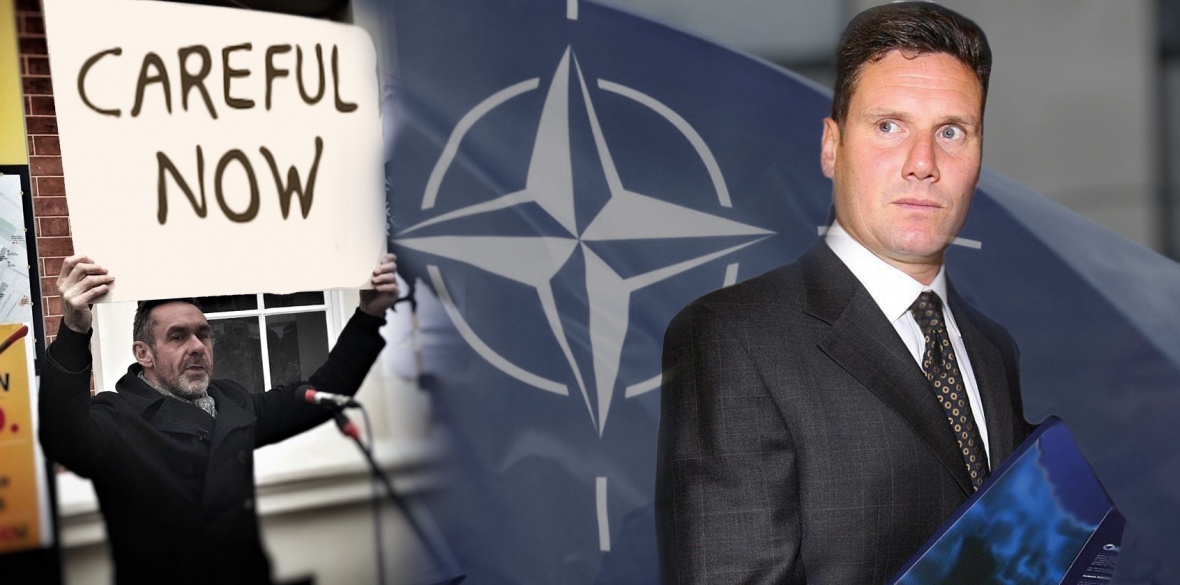This is the last article you can read this month
You can read more article this month
You can read more articles this month
Sorry your limit is up for this month
Reset on:
Please help support the Morning Star by subscribing here
WE have become accustomed to the phenomenon by which the literary labour of Paul Mason, with the inevitability of a natural process, gives rise to its own negation.
After acquiring an enthusiasm for Jeremy Corbyn’s leadership of the Labour Party the lapsed Trotskyite — reacting to the disruption of a Labour rally by pro-EU elements — tweeted: “I am sick of these astroturf elitists … it’s all prep for a millionaire funded ‘centrist party’ that will unleash illegal wars, benefit cuts and drive wages to the bottom.”
Months later he was arguing in the New Statesman for a second EU referendum just as the millionaire-funded Change UK centrist party was created precisely to facilitate that very thing.
A month ago, in a piece entitled The Left, the Party and the Class, adorned in Gramscian language and aimed at a sceptical Labour left, he presented himself as “part of a left that wants to engage with Starmer’s project and to help shape it, defending its core agenda of climate, social and economic justice from the inevitable pushback from the party’s right…”
Mason argues that we need a left government to overcome neoliberalism and Labour is the only party that can make it happen. He appeals to the left not to leave the party “no matter how blatant the provocation.”
Despite his protestations of enduring loyalty, Mason has been treated with quite singular ingratitude by the new Labour leader.
Before his piece was written Starmer had already set about dismantling the foundations of Mason’s argument with the most blatant provocations possible — sacking Rebecca Long Bailey, splashing the party’s cash on payouts to staffers who attacked the party on Panorama and repudiating the report which detailed the sabotage of the party’s election campaigning.
And now Starmer’s appointee as the new party general secretary has issued a verbot on the discussion of these matters with a threat that local party officers could face legal liabilities if they permit them to be discussed.
Turning the other cheek, Mason doubles down on his new project and offers yet another analysis of the present conjuncture — and one that by uncanny coincidence dovetails with the revisionist prospectus set out by Claire Ainsley, Starmer’s newly appointed policy chief.
Such symmetry is surely serendipitous.
She argues and Mason quotes approvingly: “Structural changes to the British economy over the past 40 years have created a new working class, which is multi-ethnic, composed of people living off low to middle incomes and likely to be occupied in service sector jobs like catering, social care or retail.
Many of them will not define themselves primarily through their work at all. The new working class is more disparate, more atomised and occupies multiple social identities, which makes collective identity less possible.”
Using this definition Mason’s argument proceeds with the assertion that the “traditional” working class — defined as distinct from this new working class — “retains a strong collective identity, which has been increasingly defined against the progressive cultural values of younger, more diverse, city-dwelling workers.”
This puts into theory a revived version of New Labour’s political practice that marginalised both this notionally “traditional” working class as well as the many millions of working people that capitalism constantly reconstitutes as a “new” working class.
Of course, this mechanical rendering of what is a dramatic reordering of capitalist society discounts the reality that this “new” working class is the continuing human embodiment of “traditional” workers and their families now inserted into a low-wage service economy.
One way of understanding the defection of critical numbers of former Labour voters is the sense that the abandonment of the pledge to honour the Brexit vote crystallised in the minds of many the extent of Labour’s long-term disengagement from these communities.
That this process is reversible is demonstrated first by Labour’s huge increase in its vote in the 2017 election and second by a loss of many of these votes in the 2019 election.
When asked, in a 2019 survey, what were the principal reasons for voting the way they did, 32 per cent said “getting Brexit done” and just 4 per cent wanted to stop Jeremy Corbyn becoming prime minister.
Mason argues that to win in 2024 Labour needs to build a broader electoral coalition, that a values divide and “neoliberal fatalism” (plus Scotland) are new, strategic obstacles and that these “cultural divides” won’t be overcome by appeals to common economic interests.
This refashioning of the proletarian subject of history to be reconstituted around the diverse identities people assume is of a piece with passing intellectual fashion and is hardly new.
Our understanding of the processes by which capitalism constantly reorganises production and the working class is best expressed by Marx and Engels in their 1848 Manifesto of the Communist Party.
“The bourgeoisie cannot exist without constantly revolutionising the instruments of production and thereby the relations of production and with them the whole relations of society.
“Conservation of the old modes of production in unaltered form, was, on the contrary, the first condition of existence for all earlier industrial classes.
“Constant revolutionising of production, uninterrupted disturbance of all social conditions, everlasting uncertainty and agitation distinguish the bourgeois epoch from all earlier ones.
“All fixed, fast-frozen relations, with their train of ancient and venerable prejudices and opinions, are swept away, all new-formed ones become antiquated before they can ossify.
“All that is solid melts into air, all that is holy is profaned and man is at last compelled to face with sober senses his real conditions of life and his relations with his kind.”
Mason’s prejudices rarely survive long enough to deserve the appellation “ancient and venerable” but in dispensing with the common economic interests of the working class as the critical factor in constituting the party of Labour, he goes back a century to the moralising foundations of Fabianism with the assertion that the likely narrative framework for a revival of Labour’s fortunes is that of “social justice.”
This rather vanilla confection is given a squirt of flavouring with a forced analogy (care of Gramsci) that Corbyn’s “war of manoeuvre” failed and so we need a “war of position.”
Like many a revisionist, Mason makes absolute Gramsci’s distinction between a “war of manoeuvre” — typically an insurrectionary assault on the bourgeois state seen by the masses as the illegitimate instrument of a discredited ruling class, against a “war of position” — supposedly a gradual assertion of working-class hegemony within capitalist society.
Gramsci’s writing — even dressed in the opaque language that prison surveillance and censorship imposed — deployed a much more sophisticated conception of ruling-class hegemony that, following contemporary Comintern thinking, saw coercion and consent in dialectical unity.
Mason reorders Gramsci’s reflection on the nature of the revolutionary party — ie the party of proletarian dictatorship — to apply to Labour.
He writes: “A mass party of the working class has to not only mobilise and represent its own base: it has to enable its members to assume the intellectual and moral leadership of the whole of society. That is the meaning of the term commonly associated with Gramscian politics: hegemony.”
Fortunately, Mason gives us a brief prospectus of what elements in actually existing ruling class hegemony his intellectual and moral leadership would leave untouched.
In explicitly rejecting an “anti-imperialist foreign policy,” he argues for continued membership of Nato and the IMF while insisting we leave inviolable 50 per cent of the economy in private hands.
Quite how this is to be reconciled with effective measures to combat the “major economic slump heading our way” — dealing with which, he says, “timid centrism won’t work.”
The central logic of Mason’s essay is a plea for the Labour left and the left beyond Labour to limit its ambitions to such policies as the Parliamentary Labour Party and the Starmer leadership consider compatible with their strategy of stasis.
The result of this is that on some policy questions, Trident for example, the SNP is to official Labour’s left. It means that in response to the A-level debacle, the Lib Dems can call for the resignation of the Education Secretary — but Labour cannot.
Quite how this will recover Labour’s position in Scotland or allow angry students to see Labour as their party remains obscure. The list of Labour policy positions which lay abandoned grows ever longer.
To Gramsci’s wars of position and manoeuvre, Mason now adds Starmer’s strategy of immobility, a dogged refusal to take an oppositional position; an absolute refusal to go on the offensive.
The consequence of this is that after months of the new leadership which, we were assured, would see Labour 20 points ahead of the Tories, the party lags nine points behind — while an absolute majority of Labour supporters anticipate a Tory victory in five years’ time.
According to this latest Labour List poll, more supporters were “very unhappy” with the new leadership (34.3 per cent) than those “happy” with it (33.8 per cent).
Of the policies advanced by Labour under the Corbyn leadership in the 2019 general election, big majorities are registered for:
- Cut the substantial majority of carbon emissions by 2030 (82 per cent)
- The creation of one million green jobs (74 per cent)
- Closing tax loopholes enjoyed by private schools (73 per cent)
- An increase in income tax for those earning over £80,000 (71 per cent)
- Renationaliseation of mail, rail, energy and water (67 per cent)
- The repeal of anti-trade union legislation (64 per cent)
- Scrapping tuition fees (61 per cent)
- The extension of full voting rights to all UK residents (61 per cent)
- The establishment of a publicly owned generic drug company (60.5 per cent)
- Compensation for the WASPI women (57 per cent)
- The introduction of maximum pay ratios of 20:1 in the public sector (56 per cent)
- The aim of a 32-hour working week within a decade (51 per cent)
And a whisker under half favour still the introduction of free and fast broadband.
Labour in Parliament has abandoned almost all discussion or promotion of these policies and the official (and unofficial) party bans on much political activity mean that the salience of these issues is greatly diminished in the political debate.
Of the signature policies which the Labour right insisted upon, there is little enthusiasm: just one in eight want to renew Trident.
The party has been put into a state of induced coma with conference abandoned, to be replaced with an online talk-fest and internal party debate is circumscribed by edict.
The events of the last four years have demonstrated to much of the serious left and many millions of Labour voters that political and ideological divisions run through parties as well as between them.
The divisions in the Tory Party and in Labour are topical talking points. They reflect, in the case of the former, divisions in the ruling class, and in the latter, the resistance mass struggle creates to the dominance of ruling class ideas in the working class.
When the contradictions become acute there always arises a “centrist” compromise that seeks to reconcile opposites. It is in this narrow and diminishing space that Mason occupies before his next dizzying leap.
Nick Wright blogs at 21centurymanifesto.wordpress.com.










